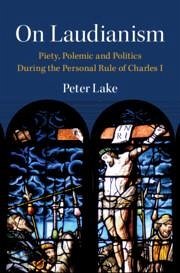
On Laudianism
Versandkostenfrei!
Versandfertig in 1-2 Wochen
48,99 €
inkl. MwSt.
Weitere Ausgaben:

PAYBACK Punkte
24 °P sammeln!
Laudianism was both a way of being Christian and a political ideology. This definitive account of this intensely controversial movement explores how it helped cause the English civil war, but over the long term provided one of the visions of the national church, one that has been in contention to define 'Anglicanism' ever since.














